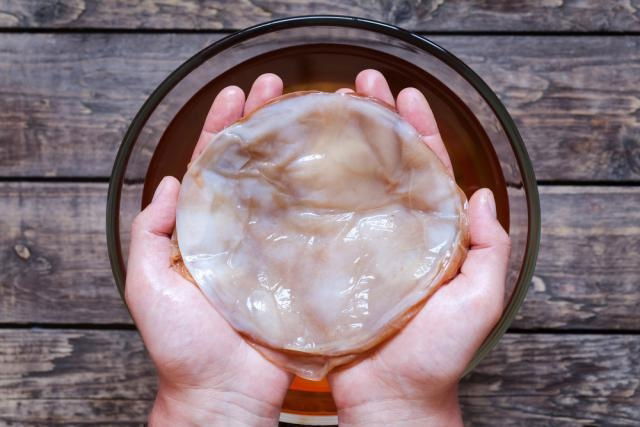Kombucha is made of sweetened black tea that has been fermented with natural yeast and bacteria. Its preparation is actually similar to that of homemade yogurt and kefir, but with black tea used instead of milk.
This drink helps to strengthen the immune system and improve bowel function.
Black tea and white sugar are the most common ingredients used to make kombucha, but you can also add other herbs and additional ingredients to vary its flavor. Other commonly used ingredients in kombucha are green tea, hibiscus tea, mate tea, fruit juice and ginger, to give it a more pleasant flavor.

Health benefits
Kombucha originated in China and tastes like a sparkling apple cider. It is associated with many health benefits, such as:
- Contributes to weight loss because it regulates appetite and decreases obesity;
- Fights gastritis, by eliminating H. pylori bacteria, one of the common causes of gastritis;
- Prevents intestinal infections by fighting bacteria and fungi that cause illness in the gut;
- Helps to detox the body, by binding to toxic molecules in the body and stimulating their elimination through the urine and feces;
- Relieves and prevents problems like gout, rheumatism, arthritis and kidney stones, by detoxifying the body;
- Improves the functioning of the intestine by regulating the intestinal flora and working as a laxative;
- Balances blood pH, which makes the body naturally stronger against disease;
- Reduces stress and fights insomnia, making it a good choice for periods of increased stress, like during exams;
- Reduces headaches and the tendency to develop migraines;
- Improves liver function, making it a good choice after taking antibiotics;
- Strengthens the immune system as it contains high levels of antioxidants that act in the gut;
- Prevents diseases like diabetes and cancer because it improves the functioning of the whole body;
- Normalizes blood pressure;
- Decreases the symptoms of menopause;
- Prevents urinary tract infections because it is a good source of fluids, which will help you to produce more urine.
The benefits of kombucha are greater than when black or green teas are taken in their traditional form, and therefore this beverage can be used as a powerful health aid.
How to make kombucha at home

To prepare the kombucha base, also called "first fermentation", you should follow these steps:
Ingredients
- 3 L (about 0.75 gallons) of mineral water;
- Stainless steel, glass or ceramic jar;
- 1 cup of refined sugar (white sugar);
- 5 sachets of black tea;
- 1 kombucha mushroom, also called a Scoby;
- 1 glass container scalded with hot water;
- 300 ml (10 oz) of ready-made kombucha, equivalent to 10% of the total volume of kombucha to be produced
Preparation
First, you must thoroughly wash your hands and utensils, then pour hot water and vinegar over them to help eliminate any contamination by microorganisms. Pour the water in a pot, and bring to a boil. When boiling, add the sugar and mix until dissolved. Then turn off the heat and add the tea bags, and allow the bags to soak for 10 to 15 minutes.
Pour the tea in the glass jar and wait until it cools completely reaches room temperature. Then add the kombucha mushroom and the ready-made kombucha. Cover the glass jar with a cloth and an elastic band, which will allow air to circulate without leaving the mixture exposed. Store the bottle in an airy place without much light for about 6 to 10 days, at which time the final drink will be ready. It will have a vinegary aroma and will not be sweet. At the end of the process, a new kombucha colony is formed on top of the first one. This new colony can be stored in the refrigerator or donated to someone else.
Heatlh kombucha recipes
Also called second fermentation kombucha, the kombucha can be flavored with ingredients like ginger, pear, grape, strawberry, lemon, pineapple, orange and other fruits. Adding fruit gives you the advantage of further health benefits provided by the fruit.
Fruitand other ingredients should be added to the ready-prepared kombucha base, and in this fermentation the drink will become carbonated, resembling a soda.
Kombucha with lemon and ginger
Ingredients:
- 1.5 liters (0.4 gallons) of kombucha;
- 3-5 slices of ginger;
- The juice of 1/2 a lemon;
- Container or bottle to store drink (with air-tight lid).
Preparation:
Place the ginger slices and the lemon juice at the bottom of the container. Add the kombucha to the container, filling it all the way to the top so that there is no air in it. Place the lid and let it rest for 3 to 7 days, which is the time required for further fermentation. In general, this flavored beverage will be ready after 5 days of fermentation. However, the drink creates gas quickly and some people like its taste after only 24 hours of the second fermentation process.
To make the kombucha with other flavors, you simply have to mix the fruit in the blender, strain and add the juice to the bottle along with the kombucha base, then wait for 5 days, because the new fermentation will add flavor to the drink.
Where to buy kombucha
Ready-to-drink kombucha can be found in health food and nutrition stores. It can be found in both the traditional flavor and enhanced with varied fruit and spice flavors.
Scoby, which is the kombucha mushroom with the fungi and bacteria responsible for the fermentation of the drink, can be found on websites or forums on the internet that offer Scoby for free, just like with kefir. As with each fermentation a new Scoby is formed, kombucha consumers usually donate their Scobys to other people who wish to make the drink at home.
